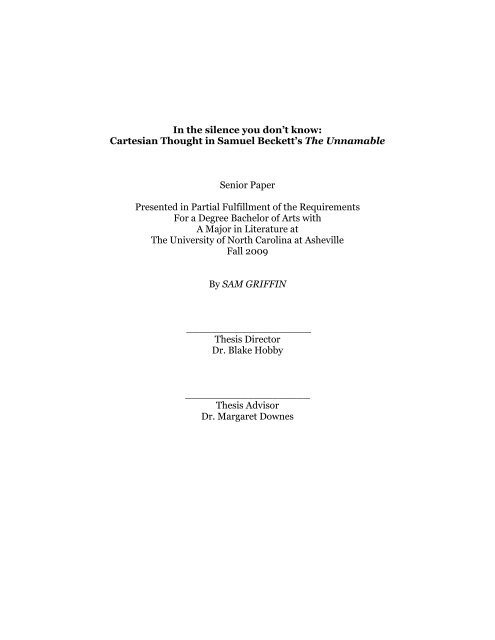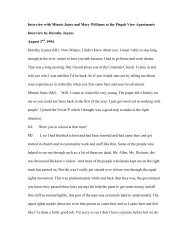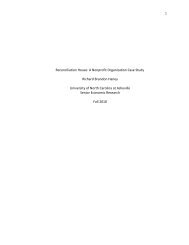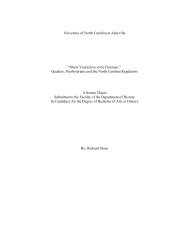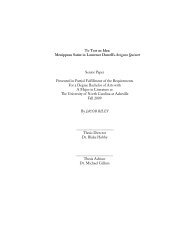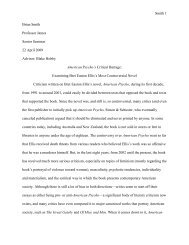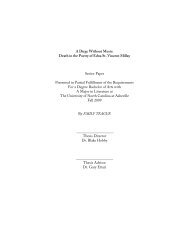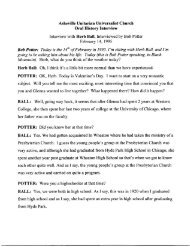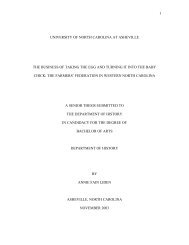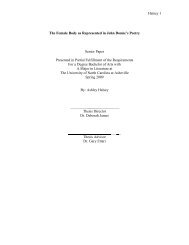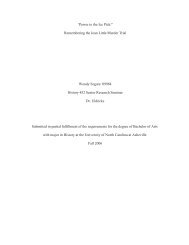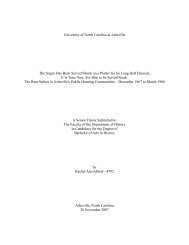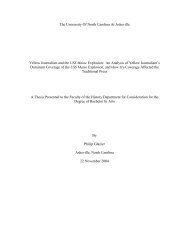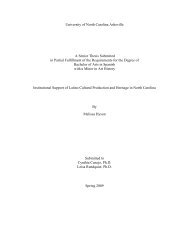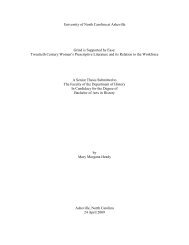Cartesian Thought in Samuel Beckett's The Unnamable
Cartesian Thought in Samuel Beckett's The Unnamable
Cartesian Thought in Samuel Beckett's The Unnamable
- No tags were found...
You also want an ePaper? Increase the reach of your titles
YUMPU automatically turns print PDFs into web optimized ePapers that Google loves.
In the silence you don’t know:<strong>Cartesian</strong> <strong>Thought</strong> <strong>in</strong> <strong>Samuel</strong> Beckett’s <strong>The</strong> <strong>Unnamable</strong>Senior PaperPresented <strong>in</strong> Partial Fulfillment of the RequirementsFor a Degree Bachelor of Arts withA Major <strong>in</strong> Literature at<strong>The</strong> University of North Carol<strong>in</strong>a at AshevilleFall 2009By SAM GRIFFIN____________________<strong>The</strong>sis DirectorDr. Blake Hobby____________________<strong>The</strong>sis AdvisorDr. Margaret Downes
Griff<strong>in</strong> 2Where one can do noth<strong>in</strong>g, one should want noth<strong>in</strong>g.–Arnold Geul<strong>in</strong>cx<strong>Samuel</strong> Beckett’s <strong>The</strong> <strong>Unnamable</strong> is a monologue. A rant, if you will, that is sett<strong>in</strong>g, plot,and action: a prolonged speech that constitutes every element of the novel, and as aresult, every element of the protagonist’s existence. <strong>The</strong> structure of <strong>The</strong> <strong>Unnamable</strong>suggests discovery, or <strong>in</strong> the <strong>Unnamable</strong>’s case, the process of becom<strong>in</strong>g undiscovered: astructure suggest<strong>in</strong>g philosophy, or the craft<strong>in</strong>g thereof. <strong>The</strong> <strong>Unnamable</strong> is a discourseon life and death, on <strong>in</strong>formation and mis<strong>in</strong>formation, and on existence and deletion;<strong>The</strong> <strong>Unnamable</strong> describes literally los<strong>in</strong>g oneself amongst the heaps of gestures,comments, and actions that constitute the human condition, along with the result<strong>in</strong>gmental and physical mutations. <strong>The</strong> book is <strong>in</strong> stream-of-conscious form, an <strong>in</strong>flux of<strong>Cartesian</strong> th<strong>in</strong>k<strong>in</strong>g self separated from its body, and when viewed <strong>in</strong> light of RenéDescartes’ Discourse on Method and Meditations, Beckett’s novel seems like homage tothe Enlightenment th<strong>in</strong>ker. Despite the similarities, there is a major deviation betweenBeckett and Descartes: where Descartes leaves his meditations and discourse with newresolve, Beckett’s <strong>Unnamable</strong> is locked <strong>in</strong> its eternal cyclic mus<strong>in</strong>gs. Descartes achievessupposed knowledge, and the <strong>Unnamable</strong> achieves temporary false hope fortified bydemented persistence. Beckett uses <strong>Cartesian</strong> theory, then, to show its literalabsurdity—to show that <strong>Cartesian</strong> thought is completely unrealistic. Because the usageand presentation is so blatant, Beckett’s writ<strong>in</strong>g falls <strong>in</strong>to parody, and though thestructure of Beckett’s comical methodology is not <strong>in</strong> exact accordance with Descartes,the way the <strong>in</strong>formation is delivered, along with the subject matter and structure,sufficiently evidences this literary caricature.
Griff<strong>in</strong> 3Descartes beg<strong>in</strong>s Discourse on Method by mak<strong>in</strong>g his statement of aporia: “For Ifound myself beset by so many doubts and errors that I came to th<strong>in</strong>k I had ga<strong>in</strong>ednoth<strong>in</strong>g from my attempts to become educated but <strong>in</strong>creas<strong>in</strong>g recognition of myignorance” (Descartes 113). He then beg<strong>in</strong>s to doubt, for uncerta<strong>in</strong>ty drives the <strong>Cartesian</strong>th<strong>in</strong>ker. Descartes uses methodological doubt, def<strong>in</strong>ed by four elements or stages, toseek genu<strong>in</strong>e truth: a structured approach to the skeptic abandon<strong>in</strong>g of knowledgeacquired prior to present th<strong>in</strong>k<strong>in</strong>g; <strong>in</strong> other words, Descartes discards everyth<strong>in</strong>g heknew previous to his current speculations (Descartes 120). Among the <strong>in</strong>formationdiscarded is his own reality, his own existence, for his be<strong>in</strong>g’s legitimacy calls <strong>in</strong>toquestion the means by which it was acquired: his senses; everyth<strong>in</strong>g Descartes knows upto this po<strong>in</strong>t—from <strong>in</strong>stitutions, mentors, or the world—is considered null, for it wasga<strong>in</strong>ed, as he will describe later <strong>in</strong> Discourse on Method and practically all throughoutthe Meditations, through sensory experience.To Descartes, the senses, along with all sensory perception, cannot be trusted(Descartes 129). Solidify<strong>in</strong>g this claim, Descartes dist<strong>in</strong>guishes between the real anddream worlds; he states that there is no separation, for thoughts occurr<strong>in</strong>g <strong>in</strong> dreamsalso occur <strong>in</strong> reality. A person’s senses <strong>in</strong> a dream—his or her “dream” senses—obta<strong>in</strong>false <strong>in</strong>formation because they do not actually exist; that said, because the samethoughts occur <strong>in</strong> both reality and <strong>in</strong> dreams, no thoughts can be trusted for identicalnotions are crafted by nonexistent entities (Descartes 129). S<strong>in</strong>ce this skeptical assertionstrips Descartes of practically everyth<strong>in</strong>g, he only has his thoughts, much like the<strong>Unnamable</strong>; Descartes, as seen <strong>in</strong> his Meditations, is now fully aware of his be<strong>in</strong>g andnoth<strong>in</strong>g else (Descartes 17-8).
Griff<strong>in</strong> 4<strong>The</strong> foundation of <strong>Cartesian</strong> ideals is the cogito, the idea that th<strong>in</strong>k<strong>in</strong>g composesexistence: “And observ<strong>in</strong>g that this truth ‘I am th<strong>in</strong>k<strong>in</strong>g, therefore I exist’ was so firmand sure that all most extravagant suppositions of the sceptics were <strong>in</strong>capable of shak<strong>in</strong>git…I saw that while I could pretend that I had no body and that there was no world andno place for me to be <strong>in</strong>, I could not for all that pretend that I did not exist” (Descartes127). After prov<strong>in</strong>g his m<strong>in</strong>d, Descartes conv<strong>in</strong>ces himself of several material th<strong>in</strong>gs,<strong>in</strong>clud<strong>in</strong>g his own body and a piece of beeswax (Descartes 16-23). However, throughoutthese specific meditations—those regard<strong>in</strong>g the m<strong>in</strong>d and material th<strong>in</strong>gs seen throughthe deceptive senses—there rema<strong>in</strong>s a schism between thought and reality, betweenm<strong>in</strong>d and body. Descartes classifies these as two different realms, thus creat<strong>in</strong>g his ideaof dualism. One realm can undoubtedly <strong>in</strong>fluence the other; the m<strong>in</strong>d and body areconnected by subtle mediums (McDonald 78). <strong>The</strong>y are also dependent on one another,both ends needed to construct human experience.In <strong>Cartesian</strong> terms, the body void of a soul is a mach<strong>in</strong>e, a m<strong>in</strong>dless apparatusthat operates without conscious <strong>in</strong>tention; corpuses are, as def<strong>in</strong>ed by Alv<strong>in</strong> Snider <strong>in</strong>his article “<strong>Cartesian</strong> Bodies,” “soulless automatons outwardly <strong>in</strong>dist<strong>in</strong>guishable fromliv<strong>in</strong>g be<strong>in</strong>gs” (299). Human anatomy is not organic but mechanistic; the soul, or one’s<strong>in</strong>terior monologue, is the catalyst for everyth<strong>in</strong>g “human,” or “outwardly” humanlike(300). <strong>The</strong> human mach<strong>in</strong>e without any mental capacity beyond rudimentary survival isthen a <strong>Cartesian</strong> Body: “…mach<strong>in</strong>es <strong>in</strong> space, composed of mach<strong>in</strong>e parts, while them<strong>in</strong>d, the soul, is someth<strong>in</strong>g else” (Hack<strong>in</strong>g 80). In his dist<strong>in</strong>ction between m<strong>in</strong>d andbody, Descartes creates a be<strong>in</strong>g hierarchy consist<strong>in</strong>g of two tiers: the lower, flesh andorganic matter <strong>in</strong>habits, and the upper, the m<strong>in</strong>d and soul. <strong>The</strong> only th<strong>in</strong>g above thisstructure is God, who is, accord<strong>in</strong>g to Descartes, the perfect be<strong>in</strong>g, far above any sort of
Griff<strong>in</strong> 5physical and mental deviation; the sole entity below the tiers is the “evil genius,” thehypothetical be<strong>in</strong>g that is the harb<strong>in</strong>ger of all deception, yet also div<strong>in</strong>e <strong>in</strong> stature(Descartes 13-4, 25-7; Curley 36). <strong>The</strong> “evil demon” is merely a supposition, and istherefore a creation of Descartes’ thoughts.<strong>The</strong> <strong>Cartesian</strong> worldview is lonely: souls exist<strong>in</strong>g <strong>in</strong> animated mach<strong>in</strong>es, millionsof m<strong>in</strong>ds trapped <strong>in</strong>side countless organic prisons. <strong>The</strong> only th<strong>in</strong>gs that allow the corpussensuality and satisfaction, the senses, are deceptive and cannot be trusted. Ultimatetruth is obta<strong>in</strong>able, though only through a pa<strong>in</strong>stak<strong>in</strong>g process of mental rebirth: bystripp<strong>in</strong>g what is known down to a naked, nameless core, a dark <strong>in</strong>ner sanctum fromwhich to beg<strong>in</strong>, one reasons oneself back to truth. <strong>The</strong> prose of <strong>Samuel</strong> Beckettoftentimes mirrors this bleak, isolated outlook. From “Whoroscope,” his poetic debut, to<strong>The</strong> <strong>Unnamable</strong>, the f<strong>in</strong>al novel of the Trilogy, Beckett uses <strong>Cartesian</strong> th<strong>in</strong>k<strong>in</strong>g as basis.<strong>The</strong> way <strong>in</strong> which he employs Descartes’ theories shifts as his prose evolves, yet hisliterary substance—isolation, desolation, desperation, and ambiguity—rema<strong>in</strong>s.“Whoroscope,” published <strong>in</strong> 1930, is among the first of his published literature.Not only is the subject of the poem René Descartes, but it also describes the philosophersitt<strong>in</strong>g down to an omelet or, more specifically, wait<strong>in</strong>g for an omelet to be served,complete with overripe eggs; <strong>in</strong> the poem’s footnotes, snippets of Descartes’ life arereferenced to random l<strong>in</strong>es of poetry, loosely describ<strong>in</strong>g some aspect of thephilosopher’s life or ideas (McDonald 73). William Ste<strong>in</strong>, <strong>in</strong> his article “Beckett’s‘Whoroscope’: Turdy Ooscopy,” writes on Beckett’s poem:On the one hand, he affirms Descartes’ premise <strong>in</strong> the Meditations of theclosed consciousness, the utterly baffl<strong>in</strong>g aspects of the experience ofcogito ergo sum that are to become the substance of Beckett’s later fiction
Griff<strong>in</strong> 6and drama, though with somewhat of a twist. On the other hand, heparodies Descartes’ expedient Christian piety <strong>in</strong> the superstition of thedeathbed agon of the addled conscience. (125)Ste<strong>in</strong> writes further of Beckett’s “paradoxical love and scorn for the philosopher’s modesof thought” <strong>in</strong> the article, reveal<strong>in</strong>g “Whoroscope” as a labyr<strong>in</strong>th of Descartes references,as well as <strong>Cartesian</strong> th<strong>in</strong>k<strong>in</strong>g; Ste<strong>in</strong>’s speculations are not limited to Discourse onMethod nor the Meditations, but refer to all of Descartes works, such as the Treatise onMan (135-40). More importantly, Ste<strong>in</strong>’s comment on cogito ergo sum as the basis formany of Beckett’s later works strengthens the claim of <strong>Cartesian</strong> parody <strong>in</strong> <strong>The</strong><strong>Unnamable</strong>.Aside from his early poetry, Beckett’s first published novel, Murphy, conta<strong>in</strong>s agreat deal of <strong>Cartesian</strong> separation; it is the first selection written after Whoroscope torepresent dualism. Also, understand<strong>in</strong>g the <strong>Cartesian</strong> elements of Murphy creates astepp<strong>in</strong>g stone towards comprehend<strong>in</strong>g <strong>The</strong> <strong>Unnamable</strong>; <strong>in</strong> Murphy, the narrator is adualistic th<strong>in</strong>ker, and <strong>in</strong> <strong>The</strong> <strong>Unnamable</strong>, the narrator is immersed <strong>in</strong> a <strong>Cartesian</strong>reality. Accord<strong>in</strong>g to S.C. Ste<strong>in</strong>berg, author of “<strong>The</strong> External and Internal <strong>in</strong> Murphy,”Murphy is an allegorical text, written to demonstrate the dist<strong>in</strong>ction between m<strong>in</strong>d andbody <strong>in</strong> a fictional format. “Through a series of subtle motifs, word patterns, andstructural <strong>in</strong>cidents, Beckett has created the physical as the antithesis of the mental”(Ste<strong>in</strong>berg 93). In Murphy, the physical and mental are two different worlds; theprotagonist, Murphy, attempts to transcend each of these, long<strong>in</strong>g for the eventual“Noth<strong>in</strong>g”; a desire not unlike the <strong>Unnamable</strong>’s wish for silence (93-4). In the <strong>Cartesian</strong>vision, the earthly plane is littered with m<strong>in</strong>dless mach<strong>in</strong>es; to exist <strong>in</strong> this world,especially with Descartes’ theories <strong>in</strong> m<strong>in</strong>d, is a bleak prospect. Murphy wishes to enter
Griff<strong>in</strong> 7the <strong>in</strong>ner world to exist among the “<strong>in</strong>f<strong>in</strong>ite substances,” which, as Descartes describes<strong>in</strong> the Meditations, hold more concrete “realities” (Descartes 31). In do<strong>in</strong>g this, he wouldseparate himself from physical reality. It does not seem that Beckett <strong>in</strong>tended parodywith Murphy because this separation is not portrayed <strong>in</strong> an entirely negative light.Rather, the restrictions set forth by the body, as well as his <strong>in</strong>ability to transcend to arealm constituted only by the m<strong>in</strong>d—as <strong>in</strong> <strong>The</strong> <strong>Unnamable</strong>—tortures Murphy and thenarrator (Ste<strong>in</strong>berg 109). Thus, the characters are isolated, alienated, and mentallyantagonized.Though scholars generally see the novel as <strong>Cartesian</strong>, Murphy separates fromRené Descartes and focuses more on the writ<strong>in</strong>gs of Belgian th<strong>in</strong>ker Arnold Geul<strong>in</strong>cx.Whereas Descartes believes the m<strong>in</strong>d and body to be separate but not completely<strong>in</strong>dependent of one another, Geul<strong>in</strong>cx sees the two entities as entirely different(McDonald 78-9). In <strong>The</strong> Cambridge Introduction to <strong>Samuel</strong> Beckett, Rónán McDonalddescribes Geul<strong>in</strong>cx’s dist<strong>in</strong>ction: “Geul<strong>in</strong>cx argued that m<strong>in</strong>d and body are whollyseparate, and that they only cooperate as a result of God’s <strong>in</strong>tervention. <strong>The</strong> m<strong>in</strong>d doesnot <strong>in</strong>struct the foot to walk. Rather, the idea of walk<strong>in</strong>g enters the m<strong>in</strong>d, which is theoccasion for God to cause the motion of walk<strong>in</strong>g” (McDonald 78). Also, whereasDescartes declares that God proves the existence of prist<strong>in</strong>e truth and the assurance thatone holds knowledge, Arnold Geul<strong>in</strong>cx states that God is proof of not know<strong>in</strong>g. In otherwords, Geul<strong>in</strong>cx uses God as evidence of def<strong>in</strong>ite ignorance (Uhlmann 351). BecauseGod knows someth<strong>in</strong>g that man doesn’t, man is therefore ignorant <strong>in</strong> the fact that hedoes not know someth<strong>in</strong>g. Though Murphy believes the m<strong>in</strong>d and body to be impartial,God is not the harb<strong>in</strong>ger of action; <strong>in</strong>stead, planetary patterns govern the deeds ofmank<strong>in</strong>d (McDonald 79). This pattern is not what we see <strong>in</strong> <strong>The</strong> <strong>Unnamable</strong>: though the
Griff<strong>in</strong> 8<strong>Unnamable</strong> th<strong>in</strong>ks of the physical world as separate from his own, what he th<strong>in</strong>ks affectsthe physicality of the supposed realm. All images that <strong>in</strong>clude the <strong>Unnamable</strong>, Mahood,or Worm <strong>in</strong> physical form are helpless to the movement of the m<strong>in</strong>d; the narrator’scorporeal state fluctuates as the mental discourse does. In Murphy, on the other hand,the m<strong>in</strong>d and body do not affect one another, thus relat<strong>in</strong>g more to Geul<strong>in</strong>cx’sdist<strong>in</strong>ction.Though the nature of separation differs, Beckett’s description of the mental plane<strong>in</strong> Murphy resembles the <strong>Unnamable</strong>’s surround<strong>in</strong>gs. <strong>The</strong> narrator <strong>in</strong> Murphy describesthe three areas with<strong>in</strong> Murphy’s m<strong>in</strong>d: light, semi-dark, and dark (Cous<strong>in</strong>eau 224).Though this differentiates Murphy from <strong>Cartesian</strong> dualism—as it has <strong>in</strong>stead become a“tripartite” <strong>in</strong>stead of a pair—these environments illustrate literally the <strong>Unnamable</strong>’sworld, as seen <strong>in</strong> the beg<strong>in</strong>n<strong>in</strong>g of the novel (Cous<strong>in</strong>eau 224). For example, the<strong>Unnamable</strong> <strong>in</strong>itially resides <strong>in</strong> darkness, with occasional flashes of light <strong>in</strong> the supposeddistance; the realm of light is long past, if it ever was, and memories that place the<strong>Unnamable</strong> <strong>in</strong> light are false memories because Mahood tells them (Beckett 287, 292;T<strong>in</strong>dall 16). <strong>The</strong> <strong>Unnamable</strong> cannot be deceived by a concrete reality because there isnot one immediately available, reliev<strong>in</strong>g him of the agony experienced by Murphy. BothMurphy and <strong>The</strong> <strong>Unnamable</strong> exhibit <strong>Cartesian</strong> qualities, but while Murphy longs to ridhimself of material existence, the <strong>Unnamable</strong> has already done so, whether <strong>in</strong>tentionallyor not, and is still miserable. <strong>The</strong> novels form a sort of cha<strong>in</strong>, a Beckettian testament toDescartes and <strong>Cartesian</strong> dualism: to transcend the material to the mental is not onlyimpossible and agoniz<strong>in</strong>g, but also futile.But, although Beckett portrays Descartes’ philosophies <strong>in</strong> such a light, Beckettdoes not necessarily scorn. L Roesler, <strong>in</strong> his article “Beckett Lecteur de Descartes: Vers
Griff<strong>in</strong> 9une Metaphysique Parodique,” argues that Beckett, while adopt<strong>in</strong>g qualities ofDescartes <strong>in</strong> his writ<strong>in</strong>g, does so for the sake of comic satire and parody (Roesler). ForRoesler, this satirical writ<strong>in</strong>g results from Beckett’s take on Descartes: that <strong>Cartesian</strong>existence is impossible. Beckett is forced to use parody and satire because of his stanceon the plausibility of Descartes’ writ<strong>in</strong>gs. Roesler states that Beckett has no ill <strong>in</strong>tentionwhen parody<strong>in</strong>g, but is only us<strong>in</strong>g Descartes as a platform to accurately display thehuman condition and its supposed <strong>Cartesian</strong> qualities: “Mais cette satire n’a rien devicieux ni de cruel, car Beckett, dans son oeuvre, s’attache plus à montrer la fragilité: dela condition huma<strong>in</strong>e que les défaillances de le méthode cartésienne” (Roesler). Thatsaid, Beckett sees <strong>Cartesian</strong>ism as impossible and obsolete, yet as a valuable means toportray his own fictional, and perhaps autobiographical, literary worldview. Thus,Beckett’s relationship with Descartes’ writ<strong>in</strong>gs is complex: we can now read theDiscourse on Method and the Meditations as fiction, and use them as literary, ratherthan philosophical, <strong>in</strong>fluences. <strong>The</strong> <strong>Unnamable</strong> undoubtedly emits <strong>Cartesian</strong><strong>in</strong>spiration, and Roesler’s assertions make the comparisons <strong>in</strong>creas<strong>in</strong>gly plausible.<strong>The</strong> <strong>Unnamable</strong> does not only share aff<strong>in</strong>ities with <strong>Cartesian</strong> thought; the entirenovel is comprised of deception and doubt, the faculties on which cogito is crafted. <strong>The</strong><strong>Unnamable</strong> resides <strong>in</strong> complete ambiguity, unsure of anyth<strong>in</strong>g: the narrator does notknow for sure who he is, what he is, how he is communicat<strong>in</strong>g, if he is communicat<strong>in</strong>g,or anyth<strong>in</strong>g regard<strong>in</strong>g anyth<strong>in</strong>g (Beckett 285-6). Uncerta<strong>in</strong>ty is, like cogito, the essenceof the novel. Po<strong>in</strong>ts are stated and refuted, situations are presented and reverted, andimages are described, reiterated, and abandoned. As McDonald expla<strong>in</strong>s, “Or, no soonerhas he made an assertion about where he is or what surrounds him than he pulls it downand dismisses it as ‘lies’” (103). Characters are <strong>in</strong>troduced with important implications
Griff<strong>in</strong> 10and detailed stories, such as the ever-deceptive Mahood and the sludge pile Worm, yetare all eventually identified as the narrator’s own creation: unconsciously crafted by thenarrator to deceive, to impr<strong>in</strong>t false hope <strong>in</strong> his undertak<strong>in</strong>g towards silence (Beckett387). Silence is the only plausible end, for the <strong>Unnamable</strong> knows no truth: truth is onlya word, and the narrator is unsure whether words are credible.Before dissect<strong>in</strong>g the <strong>Cartesian</strong> aspects of <strong>The</strong> <strong>Unnamable</strong>, we must firstestablish an analytical outl<strong>in</strong>e; a summary of th<strong>in</strong>gs exam<strong>in</strong>ed. Primarily, the<strong>Unnamable</strong> and Descartes beg<strong>in</strong> from comparable standpo<strong>in</strong>ts: both are <strong>in</strong>wardlyignorant and alone. After the groundwork is established, both beg<strong>in</strong> to search for truth,and both capitalize on deception. Subsequent to this is the realization of self: what is the<strong>Unnamable</strong>, and what is Descartes? Individually, they both realize that they are th<strong>in</strong>gsthat th<strong>in</strong>k and conceive, but where Descartes presses onward, the <strong>Unnamable</strong> l<strong>in</strong>gers onthis question throughout the novel. Further<strong>in</strong>g this, <strong>The</strong> <strong>Unnamable</strong> and Descartes alsoconclude that deception orig<strong>in</strong>ates from the self. Underneath the hypothetical “EvilDemon,” Descartes’ senses deceive him; the self-propagated Mahood deceives the<strong>Unnamable</strong>. Accord<strong>in</strong>g to both, deviance from knowledge exists because of selfrestriction.However, Descartes believes <strong>in</strong> a div<strong>in</strong>e third party, a perfect be<strong>in</strong>g capableof perfect truth; therefore, Descartes knows he can never truly be deceived. <strong>The</strong><strong>Unnamable</strong>, however, dismisses the “supreme be<strong>in</strong>g” as lies (Beckett 299).F<strong>in</strong>ally, the <strong>Unnamable</strong> and Descartes vow to cont<strong>in</strong>ue. Whereas Descartesdedicates his life to further knowledge, the <strong>Unnamable</strong> devotes his to the desire forsilence, end<strong>in</strong>g <strong>in</strong> essentially the same state as he began. In Trapped <strong>in</strong> <strong>Thought</strong>: AStudy <strong>in</strong> Beckettian Mentality, Eric Levy writes:
Griff<strong>in</strong> 11Thus, the <strong>Cartesian</strong> cogito and the <strong>Unnamable</strong> are rationalist contraries.Both beg<strong>in</strong> <strong>in</strong> absolute doubt, and both beg<strong>in</strong> with <strong>in</strong>trospection. But eachuses doubt and <strong>in</strong>trospection <strong>in</strong> a way opposite to that of the other.Whereas the <strong>Cartesian</strong> cogito doubts now <strong>in</strong> order to know or affirmapodictic and <strong>in</strong>dubitable truth later, the <strong>Unnamable</strong> doubts now <strong>in</strong> orderto go on doubt<strong>in</strong>g <strong>in</strong> the future. (Levy 103)<strong>The</strong> <strong>Unnamable</strong> feeds off his methodology; his doubt is self-propagation, whereDescartes’ doubt is a stepp<strong>in</strong>g-stone. <strong>The</strong> <strong>Unnamable</strong> doubts for the sake of doubt<strong>in</strong>g,and Descartes doubts for the sake of truth. Despite the apparent differences, <strong>The</strong><strong>Unnamable</strong>, Discourse on Method, and the Meditations search for the same th<strong>in</strong>g—knowledge—but acquire different results. As Descartes states, “I th<strong>in</strong>k, therefore I am,”the <strong>Unnamable</strong> says, “I th<strong>in</strong>k, therefore I am a mere state of confusion about identity”(Levy 102). <strong>The</strong> <strong>Unnamable</strong> is <strong>Cartesian</strong> thought as stark reality, Descartes’philosophies forced <strong>in</strong>to a darker perspective, one characterized by imprison<strong>in</strong>gobsession.Both Descartes and the <strong>Unnamable</strong> beg<strong>in</strong> <strong>in</strong> isolation, though the reasons fortheir <strong>in</strong>dividual environments vary. <strong>The</strong> <strong>Unnamable</strong> has no control over location, nochoice but to cont<strong>in</strong>ue the discourse; it is as though he is a man, perhaps a skepticth<strong>in</strong>ker, placed directly <strong>in</strong>to his element. In her essay, “Where now? Who now?”Maurice Blanchot describes the <strong>Unnamable</strong> <strong>in</strong> dark isolation: “…and <strong>in</strong> fact <strong>The</strong><strong>Unnamable</strong> evokes someth<strong>in</strong>g of this malaise of a man fallen out of the world, eternallyhover<strong>in</strong>g between be<strong>in</strong>g and noth<strong>in</strong>gness, henceforth <strong>in</strong>capable of dy<strong>in</strong>g as of be<strong>in</strong>gborn, haunted by his creatures, mean<strong>in</strong>gless ghosts he no longer believes <strong>in</strong>” (147). <strong>The</strong><strong>Unnamable</strong> has no immediate knowledge about himself, and thus cont<strong>in</strong>ues to a
Griff<strong>in</strong> 12recognition of ignorance (Beckett 287-92). Descartes also describes his previousdeception <strong>in</strong> the Discourse on Method and the Meditations, though it seems he hasmade this realization before beg<strong>in</strong>n<strong>in</strong>g (Descartes 113). Both have, at this po<strong>in</strong>t, strippedeveryth<strong>in</strong>g previously known as false; they are both noth<strong>in</strong>g but thought,communications void of any plausible cause or source. Throughout <strong>The</strong> <strong>Unnamable</strong>,references are made to speech as his means of communication, though this is alsodiscredited multiple times (Beckett 301, 386). Descartes does not quite describespeak<strong>in</strong>g, per say, because his Meditations and Discourse on Method are dist<strong>in</strong>guishedas thoughts: Descartes mentally crafts everyth<strong>in</strong>g composed, and he understands this.Much like Descartes, the <strong>Unnamable</strong> eventually dist<strong>in</strong>guishes himself as a th<strong>in</strong>gthat th<strong>in</strong>ks (Beckett 340). However, Descartes uses this as a foundation for furtherspeculation, and Beckett delves deeper <strong>in</strong>to this particular question, thus plugg<strong>in</strong>g holes<strong>in</strong> the <strong>Cartesian</strong> conclusion: why is he a th<strong>in</strong>g that th<strong>in</strong>ks, and if this is all he is, can henot be a th<strong>in</strong>g that does not th<strong>in</strong>k and still ‘exist’? Is silence possible? Further still, is theconcept of existence a fabrication of his own thoughts and desires? This is opposite toDescartes’ progress, who, after realiz<strong>in</strong>g he is a th<strong>in</strong>k<strong>in</strong>g th<strong>in</strong>g, gradually proves hisphysicality. Beckett’s <strong>The</strong> <strong>Unnamable</strong> is a perversion of Descartes assertions concern<strong>in</strong>gtwo different realms of be<strong>in</strong>g, while at the same time solidify<strong>in</strong>g the philosopher’s claimof mental superiority (Descartes 31).<strong>The</strong> <strong>Unnamable</strong> is entirely disconnected from his physical self; any mention ofphysicality is, because of Mahood, subject to drastic change. As Levy concludes, “Hence,the unitary identity available to the <strong>Cartesian</strong> cogito is denied to the <strong>Unnamable</strong>, whoseattempts at self-def<strong>in</strong>ition merely explode the identity to be def<strong>in</strong>ed <strong>in</strong>to hypotheticalfragments or fragmentary hypotheses” (103). <strong>The</strong> <strong>Unnamable</strong>’s features beg<strong>in</strong>, for the
Griff<strong>in</strong> 13most part, <strong>in</strong> place. <strong>The</strong>y fade as the novel cont<strong>in</strong>ues, but, <strong>in</strong> seem<strong>in</strong>gly random<strong>in</strong>tervals, reappear as solid attributes; <strong>in</strong> one <strong>in</strong>stance, he has begun to “locate” his head,“to [his] satisfaction,” and <strong>in</strong> another, he “cannot feel a head on” him (Beckett 344,406). Sometimes he is noth<strong>in</strong>g at all, a ball <strong>in</strong> a void “talk<strong>in</strong>g about th<strong>in</strong>gs that do notexist, or that exist perhaps, impossible to know, beside the po<strong>in</strong>t” (Beckett 299).<strong>The</strong>refore, the <strong>Unnamable</strong>’s body is at the mercy of his m<strong>in</strong>d, a distant unit ever shift<strong>in</strong>gunder streams of rem<strong>in</strong>iscence. It is as though his <strong>in</strong>ner discourse, the essence of <strong>The</strong><strong>Unnamable</strong> itself, causes the narrator to lose his human features. Immers<strong>in</strong>g himself <strong>in</strong>such ignorance, <strong>in</strong> the presence of utter deception, causes him to doubt further, thusimmaterializ<strong>in</strong>g: the deeper the <strong>Unnamable</strong>’s doubt, the less physicality he emits.Also, <strong>The</strong> <strong>Unnamable</strong> does not realize he is a th<strong>in</strong>k<strong>in</strong>g th<strong>in</strong>g until late <strong>in</strong> thenovel, and then only through <strong>in</strong>direct embodiment as the character Worm (Beckett 358-9). Of course, dialogue prescribed as thought does occur earlier on, yet it is not directlyrecognized, the action “to th<strong>in</strong>k” simple utterance. Here, Beckett comments onDescartes’ dist<strong>in</strong>ction between thought and existence. Descartes believed <strong>in</strong> a dualisticseparation between m<strong>in</strong>d and body. “Descartes theorised that the m<strong>in</strong>d and body aredist<strong>in</strong>ct, but not wholly separate. He posited that the p<strong>in</strong>eal gland or the ‘conarium’ wasthe po<strong>in</strong>t <strong>in</strong> the physical bra<strong>in</strong> which mediated between body and m<strong>in</strong>d” (McDonald 78).<strong>The</strong> <strong>Unnamable</strong> is <strong>in</strong>dependent of this <strong>Cartesian</strong> divergence because it is locked on as<strong>in</strong>gle side: the mental as he says, “Speak of a world of my own, sometimes referred to asthe <strong>in</strong>ner, without chok<strong>in</strong>g” (Beckett 383). S<strong>in</strong>ce the communicatory process of thenarrator has the ability to cause physical self-destruction without a significant shift <strong>in</strong>diction, his other dualistic entity, the m<strong>in</strong>d, must be dom<strong>in</strong>ant.
Griff<strong>in</strong> 14As the <strong>Unnamable</strong>’s discourse is locked <strong>in</strong> the mental state, with the body asdistant, there is mention of a purely physical entity: Worm. He is described as an“embryonic lump;” a mass possess<strong>in</strong>g few noticeable human features (T<strong>in</strong>dall 31-2). In<strong>The</strong> <strong>Unnamable</strong>, Beckett describes Worm:He is noth<strong>in</strong>g but a shapeless heap, without a face capable of reflect<strong>in</strong>g theniceties of a torment, but the disposition of which, its greater or lesserdegree of crouch and huddledness, is no doubt expressive, for specialists,and enables them to assess the chances of its suddenly mak<strong>in</strong>g a bound, ordragg<strong>in</strong>g its coils fa<strong>in</strong>tly away, as if stricken to death. Somewhere <strong>in</strong> theheap an eye, a wild equ<strong>in</strong>e eye, always open, they must have an eye, theysee him possessed of an eye. (350)<strong>The</strong> narrator cont<strong>in</strong>ues to describe Worm at the mercy of “they”: an <strong>in</strong>visible host ofcritics that dictate to him the ways of the world, as well as various human trials andtribulations he would experience lest he ever became human (350-1). “<strong>The</strong>y” are try<strong>in</strong>gto trap Worm, to “seize him” <strong>in</strong> their “arms;” “they” are also try<strong>in</strong>g to convert the<strong>Unnamable</strong> to Worm, or to an entirely physical state (351). But it is, accord<strong>in</strong>g to the<strong>Unnamable</strong>, a “bless<strong>in</strong>g for [Worm] he cannot stir, even though he suffers because ofit…” (351). Worm is immune to “their” lessons because he is <strong>in</strong>animate, a <strong>Cartesian</strong> body<strong>in</strong> full; he possesses no soul, no ghost to operate the mach<strong>in</strong>e, and is therefore anantithesis to Mahood—the <strong>Unnamable</strong>’s ma<strong>in</strong> <strong>in</strong>fluence on the mental. <strong>The</strong> <strong>Unnamable</strong>envies Worm <strong>in</strong> his ignorance, though he is horrified by the prospect of becom<strong>in</strong>gsometh<strong>in</strong>g so utterly physical, for <strong>in</strong> this state he would “feel noth<strong>in</strong>g” (Beckett 358).Here is specified, even more so than before, the seem<strong>in</strong>gly futile separation of body and
Griff<strong>in</strong> 15m<strong>in</strong>d: the physical state renders noth<strong>in</strong>g—as seen <strong>in</strong> Worm—and the mental staterenders confused chaos—as seen through the <strong>Unnamable</strong> himself.<strong>The</strong> <strong>Unnamable</strong> narrator takes Descartes’ theory to the utmost degree: the<strong>Unnamable</strong> is deceived by outside <strong>in</strong>fluence, every <strong>in</strong>dividual sense tormented by subtlelies constitut<strong>in</strong>g existence. A host of be<strong>in</strong>gs, rang<strong>in</strong>g from previous Beckett characters toones <strong>in</strong>itially described with<strong>in</strong> <strong>The</strong> <strong>Unnamable</strong>, have created a reality for the narrator; itseems that, at the time of the <strong>Unnamable</strong>’s discourse, this reality has fallen <strong>in</strong>toshambles. Described are recollections, rem<strong>in</strong>iscences on previous events; these eventsare, accord<strong>in</strong>g to the <strong>Unnamable</strong>, lies. Descartes writes of an “evil demon” that would, <strong>in</strong>the scenario of an ever-deceiv<strong>in</strong>g universe, be the Supreme Be<strong>in</strong>g. As a result of this, thenature of the cosmos would be ultimate deception; Descartes would not prove himself,because the absence of God would result <strong>in</strong> an absence of anyth<strong>in</strong>g. He would be, muchlike the <strong>Unnamable</strong>, only a stream of thought.<strong>The</strong> characters Basil and Mahood, who are characterizations of Descartes’ “evildemon,” deceive Beckett’s narrator. Descartes describes the “evil demon” <strong>in</strong> detail:I will suppose therefore that not God, who is supremely good and thesource of truth, but rather some malicious demon of the utmost power andcunn<strong>in</strong>g has employed all of his energies <strong>in</strong> order to deceive me. I shallth<strong>in</strong>k that that the sky, the air, the earth, colours, shapes, sounds and allexternal th<strong>in</strong>gs are merely the delusions of dreams which he has devised toensnare my judgment (15).Descartes considers that he possesses no physicality or mental attributes and that all is afabrication of this “malicious demon” (Descartes 15). He cannot be sure of anyth<strong>in</strong>gbecause, <strong>in</strong> this purely hypothetical situation, there is no foundation of perfect
Griff<strong>in</strong> 16knowledge: knowledge supplied by a div<strong>in</strong>e, know<strong>in</strong>g presence, one aware of th<strong>in</strong>gsabove the th<strong>in</strong>ker’s mental capacity (Curley 36). However, the presence of Descartes“evil demon” supports his cogito, for, <strong>in</strong> ponder<strong>in</strong>g its existence, he is th<strong>in</strong>k<strong>in</strong>g;deception causes thought, and thought, to Descartes, is the essence of existence. So,even if this deceptive power did exist <strong>in</strong>stead of God, he would still exist: thus, the “evildemon” does not have control of Descartes’ psyche (Curley 36-8).Similar, if not identical, to the “evil demon” is the character Mahood. He beg<strong>in</strong>s<strong>in</strong> distant form as Basil, along with a host of followers, and is, at this po<strong>in</strong>t, removed andoverbear<strong>in</strong>g. Basil and friends teach the <strong>Unnamable</strong> about God and fellow man, alongwith “courses on love, on <strong>in</strong>telligence” (Beckett 292). <strong>The</strong>y also <strong>in</strong>struct him how tocount and reason, knowledge the narrator uses to “scratch [his] arse with” (Beckett292). In describ<strong>in</strong>g Basil, the <strong>Unnamable</strong> becomes a pupil, and Basil is the bully<strong>in</strong>gteacher; there is noth<strong>in</strong>g personal <strong>in</strong> the relationship between the <strong>Unnamable</strong> and Basil(Beckett 301). Eventually, Basil is renamed Mahood due to his <strong>in</strong>creas<strong>in</strong>g “importance,”and it is here that Mahood tells the <strong>Unnamable</strong> “stories about himself” (Beckett 303).Mahood is dictat<strong>in</strong>g the <strong>Unnamable</strong>’s life to him. Everyth<strong>in</strong>g that constitutes hismemory is a tale and is therefore someth<strong>in</strong>g separate, someth<strong>in</strong>g physical, and allattributes, suppositions, and features that he possesses are, as a result, false. Mahood isthe teacher of the <strong>Unnamable</strong>’s language, “the only one they taught me,” deem<strong>in</strong>g itartificial and all <strong>in</strong>formation conveyed through its medium null and void (Beckett 330;Fletcher 179-80; Levy 347). As Worm is, whether he realizes it or not, tortured by theambiguous “they,” the <strong>Unnamable</strong> suffers due to Mahood for identical reasons, thoughthe <strong>Unnamable</strong> does not possess the stubbornness to reject his anecdotes. Rather, he isa pliable surface, absorb<strong>in</strong>g <strong>in</strong>formation aga<strong>in</strong>st his physical will. Worm is not troubled
Griff<strong>in</strong> 17because his <strong>in</strong>animate state makes him immune; the <strong>Unnamable</strong>, possess<strong>in</strong>g franticmental qualities, cannot help but absorb the th<strong>in</strong>gs that Mahood tells him, for they<strong>in</strong>still false hope <strong>in</strong> someth<strong>in</strong>g previous, as well as <strong>in</strong> an <strong>in</strong>evitable end.Mahood and Worm are recognized as creations of the <strong>Unnamable</strong> himself, thusdeem<strong>in</strong>g them products of the narrator’s senses, or, more specifically, sensoryperception (298, 385). <strong>The</strong> <strong>Unnamable</strong> describes his situation:Now there is no one left. That’s a good cont<strong>in</strong>uation. No one left, it’sembarrass<strong>in</strong>g, if I had a memory it might tell me that this is the sign of theend, this hav<strong>in</strong>g no one left, no one to talk to you, so that you have to say,It’s I who am do<strong>in</strong>g this to me, I who am talk<strong>in</strong>g to me about me…it’s nottheirs, they were never there, there was never anyone but you, talk<strong>in</strong>g toyou about you, the breath fails, it’s nearly the end, the breath stops, it’s theend… (387)Mahood, Worm, and “they” are no longer present, for the <strong>Unnamable</strong> realizes that therewas never anyone else (387). What orig<strong>in</strong>ally seemed like legitimate memories andstories delivered by concrete outside entities have now dissolved <strong>in</strong>to the orig<strong>in</strong>aldiscourse. <strong>The</strong> fact that there was never a Basil, Mahood, or Worm causes the<strong>Unnamable</strong> to falter briefly <strong>in</strong> his dialogue; he searches for a sign of their existence,try<strong>in</strong>g to f<strong>in</strong>d someth<strong>in</strong>g they have affected with their deceptive prowess (388). Also, hedoes not know whether he has f<strong>in</strong>ally succumbed to Mahood—thus result<strong>in</strong>g <strong>in</strong> hisnewfound isolation—or if he is soon to be immersed <strong>in</strong> silence (399-400).After Mahood is denounced, Beckett’s prose becomes <strong>in</strong>creas<strong>in</strong>gly fragmentedand sporadic, as though some aspect of structure vanished with the characters. “…hesays it, or they say it, yes, they who reason, they who believe, no, <strong>in</strong> the s<strong>in</strong>gular, he who
Griff<strong>in</strong> 18lived, or saw someone who had, he speaks of me, as if I were he, as if I were not he, both,as if I were others, one after another…” (Beckett 396). <strong>The</strong> <strong>Unnamable</strong> becomes moredesperate s<strong>in</strong>ce he has noth<strong>in</strong>g to base his existence on, noth<strong>in</strong>g to prove as false, andnoth<strong>in</strong>g more to doubt. Silence is all the more appeal<strong>in</strong>g to him, for this loss of controlleads him to no new conclusions; the frequency of contradiction <strong>in</strong>creases. Language isthe only th<strong>in</strong>g left above him, and is the only th<strong>in</strong>g left to doubt and deceive; all of hisprevious mus<strong>in</strong>gs he now dismisses as “hypotheses” generated by his association withMahood (388). He can no longer stand doubt<strong>in</strong>g, for there is noth<strong>in</strong>g to not be doubted;or, <strong>in</strong> other words, everyth<strong>in</strong>g constitut<strong>in</strong>g the <strong>Unnamable</strong>’s reality is false, so there isnoth<strong>in</strong>g on which to base truth. Unlike Descartes, who, almost haphazardly, discards thenotion of a div<strong>in</strong>e evil presence, the <strong>Unnamable</strong> suffers.Descartes avoids a similar fate through God. To him, God is perfect <strong>in</strong> stature,void of deception: the harb<strong>in</strong>ger of all pure knowledge (Descartes 128). Descartes iscomforted by supreme knowledge, <strong>in</strong> know<strong>in</strong>g that it does exist alongside a powergreater than himself (Descartes 128-9). In order to make this realization, he had to“raise [his] m<strong>in</strong>d over the senses” (Descartes 129). Also, he asserts that not everyth<strong>in</strong>gknown is obta<strong>in</strong>ed through personal <strong>in</strong>formation, and thus, must have been placed <strong>in</strong>tothe conscious by a div<strong>in</strong>e be<strong>in</strong>g:So there rema<strong>in</strong>s only the idea of God; and I must consider whether thereis anyth<strong>in</strong>g <strong>in</strong> the idea which could not have orig<strong>in</strong>ated <strong>in</strong> myself. By theword ‘God’ I understand a substance that is <strong>in</strong>f<strong>in</strong>ite, <strong>in</strong>dependent, supremely <strong>in</strong>telligent, supremely powerful, andwhich created both myself and everyth<strong>in</strong>g else…that exists. (Descartes 31)
Griff<strong>in</strong> 19He has underm<strong>in</strong>ed any ambiguous deception through div<strong>in</strong>ity. However, the loopholes<strong>in</strong> Descartes’ celestial theory are the foundations for the <strong>Unnamable</strong>’s view on God. Itseems that Descartes has concluded much unknown territory by dismiss<strong>in</strong>g it assupreme knowledge; he does not know the ways of the universe, but there is a be<strong>in</strong>g thatdoes. Also, Descartes deems personal knowledge for which he knows no source ashav<strong>in</strong>g come from God.<strong>The</strong> <strong>Unnamable</strong>, on the other hand, only knows God and man through Mahood,and, therefore, only through himself: “Ah yes, all lies, God and man, nature and light ofday, the heart’s outpour<strong>in</strong>gs and the means of understand<strong>in</strong>g, all <strong>in</strong>vented, basely, by mealone, with the help of no one, s<strong>in</strong>ce there is no one, to put off the hour when I mustspeak of me” (Beckett 298). <strong>The</strong> <strong>Unnamable</strong> claims to have <strong>in</strong>vented natural law,someth<strong>in</strong>g Descartes believed ultimately div<strong>in</strong>e. He does not feel touched by the HolySpirit because his condition warrants the opposite: “Faith would require a response; yet[Beckett’s characters] are never <strong>in</strong> a position to feel assured that such a response wouldbe heard” (Bryden 74). <strong>The</strong> darkness of his void, his mental plane, does not allow forhope <strong>in</strong> anyth<strong>in</strong>g, and, because of this, no faith can be acquired. Consequently, the<strong>Unnamable</strong> does not have faith <strong>in</strong> God because, as realized late <strong>in</strong> the novel, there is nopo<strong>in</strong>t, no epiphany to reach, and no way to feel religiously complete, as Descartes doesthrough God’s perfection.God is a false be<strong>in</strong>g <strong>in</strong> <strong>The</strong> <strong>Unnamable</strong>, but He also holds great <strong>in</strong>fluence over thenarrator. He first appears dur<strong>in</strong>g Basil’s <strong>in</strong>troduction: “they also gave me the low-downon God. <strong>The</strong>y told me I depended on him, <strong>in</strong> the last analysis” (Beckett 292). Hereappears randomly, usually <strong>in</strong> blatant denunciation: “Yes, God, formenter of calm, Inever believed it, not a second;” at one po<strong>in</strong>t, the <strong>Unnamable</strong> claims div<strong>in</strong>ity: “I am
Griff<strong>in</strong> 20Matthew and I am the angel, I who came before the cross, before the s<strong>in</strong>n<strong>in</strong>g, came <strong>in</strong>tothe world, came here” (Beckett 295, 299). Not only is the latter statement bold, but itsoccurrence suggests mockery. Unlike Descartes, who live <strong>in</strong> a time of great religious<strong>in</strong>fluence, the <strong>Unnamable</strong> exists outside the physical realm. Because of this, he need notworry about physical repercussions, and can judge anyth<strong>in</strong>g as it stands. God gives the<strong>Unnamable</strong> someth<strong>in</strong>g to defy, someth<strong>in</strong>g to denounce. Also, God is a representation ofMahood, a powerful rem<strong>in</strong>der of the <strong>in</strong>vasive material world.To conclude, we beg<strong>in</strong> by observ<strong>in</strong>g the development of <strong>Cartesian</strong> thought fromMurphy to <strong>The</strong> <strong>Unnamable</strong>. In Murphy, dualism is not only exact and complete butnecessary to escape the falsities and frustrations of physical existence. Murphy longs toseparate from his material reality, the mental plane portrayed as a pa<strong>in</strong>less limbo: notparticularly enjoyable, but numb to the false, artificial work<strong>in</strong>gs of the outside world.However, <strong>in</strong> Murphy the narrator’s <strong>Cartesian</strong> goal is a positive one. His aspiration is tomake the disconnection precise, to solidify himself as purely nonexistent. <strong>The</strong> futility ofhis desire is not specified, because it is not demonstrated <strong>in</strong> full. Not until <strong>The</strong><strong>Unnamable</strong> do we see a character transcended and, because of his state, completelymiserable.In <strong>The</strong> <strong>Unnamable</strong>, <strong>Samuel</strong> Beckett portrays <strong>Cartesian</strong> theory <strong>in</strong> extremes andas ultimately false. In his article, “Three novels and Four Nouvelles,” Paul Davies writes:“Beckett then figures this <strong>in</strong> the prison of solipsism, the human shut up <strong>in</strong> a jar. <strong>The</strong> raremoments when the walls dissolve and the frustration gives way to peace show his hero,and us, that the <strong>Cartesian</strong> conclusion, though entrenched, is a false one” (Davies 58).<strong>The</strong> mental plane, that which the <strong>Unnamable</strong> <strong>in</strong>habits, is a place ridden with doubt,uncerta<strong>in</strong>ty, and deception; it is a place void of the def<strong>in</strong>ite, where all is ambiguous. <strong>The</strong>
Griff<strong>in</strong> 22narrator is alone. Perhaps Mahood was to spur false hope, someth<strong>in</strong>g that drives the<strong>Unnamable</strong> until the end. Additionally dist<strong>in</strong>guished is the art of contradiction,especially by those who claim to know the universe, and the development of cyclicallogic. F<strong>in</strong>ally, Beckett illustrates the essence of self: is there anyth<strong>in</strong>g beneathphysicality, above mentality? Can the two realms of be<strong>in</strong>g coexist without one pervert<strong>in</strong>gthe other? Or better yet, does either one exist? From this rises the <strong>Unnamable</strong>’s owndivided cogito, his self-implor<strong>in</strong>g conclusion “You must go on, I can’t go on, I’ll go on.”Works CitedBeckett, <strong>Samuel</strong>. Three Novels: Molloy, Malone Dies, <strong>The</strong> <strong>Unnamable</strong>. New York:Grove Press, 2002.Blanchot, Maurice. “Where now? Who now?”. On Beckett: Essays and Criticism. Ed.S.E. Gontarski. New York: Grove Press, 1986.Bryden, Mary. <strong>Samuel</strong> Beckett and the Idea of God. New York: St. Mart<strong>in</strong>’s Press, 1998.Cous<strong>in</strong>eau, Thomas J.. “Descartes, Lacan, and ‘Murphy’.” College Literature 11.3 (1984):223-232. JSTOR. Ramsey Library, University of North Carol<strong>in</strong>a at Asheville, NC.Web. 4 Oct. 2009.Curley, Edw<strong>in</strong>. “<strong>The</strong> Cogito and the Foundations of Knowledge.” <strong>The</strong> Blackwell Guide toDescartes’ Meditations. Ed. Stephen Gaukroger. Malden, MA: BlackwellPublish<strong>in</strong>g, 2006.Davies, Paul. “Three Novels and four nouvelles.” <strong>The</strong> Cambridge Companion to <strong>Samuel</strong>Beckett. Ed. John Pill<strong>in</strong>g. New York: Cambridge University Press, 1994.Descartes, René. <strong>The</strong> Philosophical Writ<strong>in</strong>gs of Descartes: Volume 1. Trans. JohnCott<strong>in</strong>gham,
Griff<strong>in</strong> 23Robert Stoothoff, Dugald Murdoch. Vol. 1. New York: Cambridge UniversityPress,1985.— . <strong>The</strong> Philosophical Writ<strong>in</strong>gs of Descartes: Volume 2. Trans. John Cott<strong>in</strong>gham,Robert Stoothoff, Dugald Murdoch. Vol. 2. New York: Cambridge UniversityPress, 1985.Fletcher, John. <strong>The</strong> Novels of <strong>Samuel</strong> Beckett. New York: Barnes & Noble Books, 1970.Hack<strong>in</strong>g, Ian. “Our Neo-<strong>Cartesian</strong> Bodies <strong>in</strong> Parts.” Critical Inquiry 34.1 (2007): 78-105.MLA International Bibliography, EBSCOhost. Ramsey Library, University ofNorth Carol<strong>in</strong>a at Asheville, NC. Web. 14 Oct. 2009.Hill, Leslie. Beckett’s Fiction. New York: Cambridge University Press, 1990.Levy, Eric P.. “Voice of Species: <strong>The</strong> Narrator and Beckettian Man <strong>in</strong> Three Novels.”ELH45.2 (1978): 343-358. JSTOR. Ramsey Library, University of North Carol<strong>in</strong>a atAsheville, NC. Web. 4 Oct. 2009.—. Trapped <strong>in</strong> <strong>Thought</strong>: A Study of the Beckettian Mentality. Syracuse, NY: SyracuseUniversity Press, 2007.McDonald, Rónán. <strong>The</strong> Cambridge Introduction to <strong>Samuel</strong> Beckett. New York:Cambridge University Press, 2006.Roesler, L Mr. “Beckett Lecteur de Descartes: Vers une Metaphysique Parodique.”Romanic Review 87 (1996): 557-74. Humanities Full Text. Ramsey Library,University of North Carol<strong>in</strong>a at Asheville, NC. Web. 25 August 2009.
Griff<strong>in</strong> 24Snider, Alv<strong>in</strong>. “<strong>Cartesian</strong> Bodies.” Modern Philology 98.2 (2000): 299-319. JSTOR.Ramsey Library, University of North Carol<strong>in</strong>a at Asheville, NC. Web. 14 Oct.2009.Ste<strong>in</strong>, William Bysshe. “Beckett’s ‘Whoroscope’: Turdy Ooscopy.” ELH 42.1 (1975): 125-155. JSTOR. Ramsey Library, University of North Carol<strong>in</strong>a at Asheville, NC. Web.4 Oct. 2009.Ste<strong>in</strong>berg, S.C.. “<strong>The</strong> Internal and External <strong>in</strong> Murphy.” Twentieth Century Literature18.2(1972): 93-110. JSTOR. Ramsey Library, University of North Carol<strong>in</strong>a atAsheville,NC. Web. 14 Oct. 2009.T<strong>in</strong>dall, William York. <strong>Samuel</strong> Beckett. New York: Columbia University Press, 1964.Uhlmann, Anthony. “‘A Fragment of a Vitagraph’: Hid<strong>in</strong>g and Reveal<strong>in</strong>g <strong>in</strong> Beckett,Geul<strong>in</strong>cx, and Descartes.” <strong>Samuel</strong> Beckett Today 14 (2004): 341-356. JSTOR.Ramsey Library, University of North Carol<strong>in</strong>a at Asheville, NC. Web. 14 Oct.2009.


